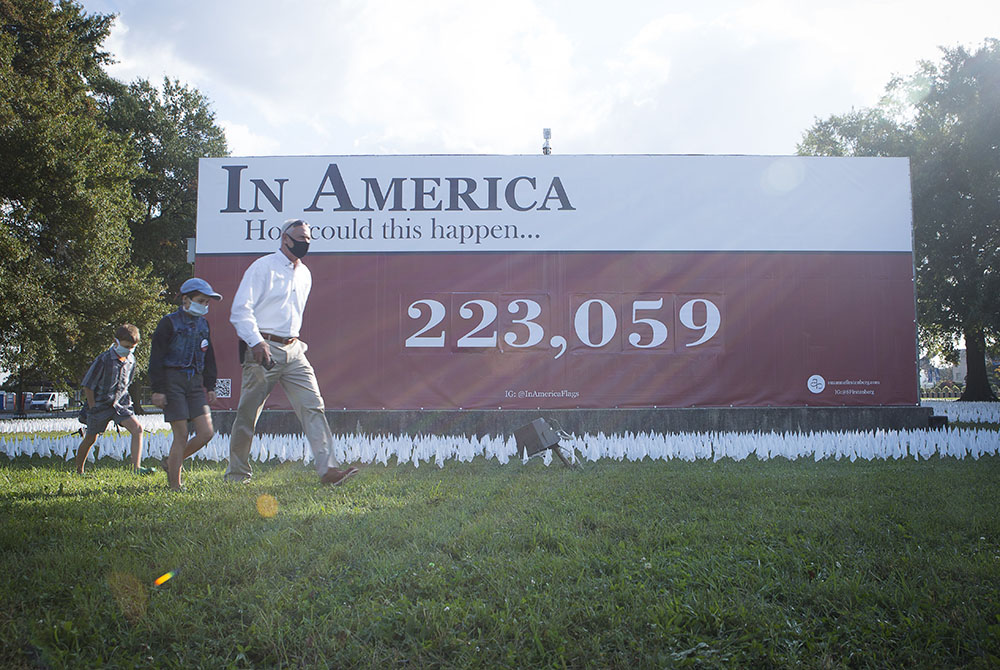
People in Washington walk near a temporary memorial for the victims of COVID-19 Oct. 23. Each day the artist adds new flags and changes the numbers to the installation as the death toll rises. As of Nov. 17, over 246,800 Americans had died from the disease. (CNS/Tyler Orsburn)
When I turned 18, a young parochial vicar, Richard Guastella, sat me down in the rectory office because I was old enough now for "the talk" about the sacred obligation of a citizen to vote. I immediately collected the form from the public library and registered.
On Election Day, I went to the polls with my parents and voted in my first national election. I vividly recall sliding the curtain open, and then it got stuck. I worried all day that my vote had been invalidated, and that if my candidate of choice lost by one ballot, somehow it would be my fault. My candidate won, and for the next four years my family blamed me for his term in office, thereby confirming my mistaken conviction that my individual vote makes a difference and not the Electoral College.
Richard Guastella was the kind of a priest who was a cross between an older brother and a first mentor. Through his steadfast encouragement, I followed him into the "family business," becoming a lay minister, an educator and a theologian. Over the years, our friendship grew and the mutuality of our influences on each other would peek through, especially between the lines of my publications and the poetry of his homilies. He was an avid NCR reader and subscriber. As a kid, I remember being impressed that he would toss the latest issue into his bag on his days off as he headed for some peace at Orchard Beach, our very own "Bronx Riviera."
The last time we were in each other's company was Inauguration Day 2017, trying to make sense of the storm portended in a president who envisioned the country in terms of "American carnage." My last text message from Richard stated simply "No fever but still coughing." He lost consciousness sometime after that and died from COVID-19 a week later in the early hours of Holy Thursday on an ICU ventilator. During los Dias de los Muertos, on mi altarcito beneath his photo, I placed the sticker that affirmed my absentee ballot. "I Voted/Yo Voté," my sacred obligation still remembered.
To me the most haunting words in Pope Francis' encyclical, Fratelli Tutti, are "They did not have to die that way" (Paragraph 19). This declaration occurs in reference to the pandemic deaths of the elderly who are too often abandoned in daily life as well as in other crises. In the context of the encyclical, these words are situated in the section subtitled "A 'throwaway' world" (Paragraphs 18-21) where Francis addresses those deemed most disposable — as determined by age, disability, race, socioeconomic status. This is not a post-pandemic encyclical. It is written from within the midst of the misery caused by a virus that outed the intersecting and devastating effects of a variety of parasitic social viruses and responses.
The political toxicity of the past five years, sandwiched between two volatile presidential campaigns, makes me suspicious of calls for reconciliation, healing and unity. I am also wary of a current rhetorical turn to the Civil War as a source of guideposts for moving forward. In any number of ways, the desire to secure a fragile union seeded further disenfranchisement for minoritized and racialized communities — people formerly enslaved, indigenous populations and those soon to be colonized in the burst of exuberant manifest destiny that followed the war.
Too much attention was paid to reconciliation with former Confederate combatants on the losing side of the conflict, and concessions were made at the expense of reparations to those formerly enslaved. Revisions to historical memory transformed secessionists into patriots of a noble "lost cause" that was more about family loyalty and states' rights than over 200 years of profiting from the unjust cruelty of chattel slavery. The orchestrated white reconciliation that saved the Union also ushered in well over a century of national segregation, sanctioned tacitly and legally, in social, political, economic, educational, sporting and even religious life. Healing that was pursued without considering those most wounded and victimized left this nation still grappling with repetitive behaviors of separating families, exploiting labor, exclusion, incarceration, violence, racism and, to borrow a turn of phrase from Fratelli Tutti, "insufficiently universal human rights."
Gettysburg may be a site of the reimagining of the U.S. American experiment, when Abraham Lincoln confronted the bloody price of national division. Yet in subsequent anniversaries, that battlefield marks the site of the intentional forgetting of the centuries of sacrifices of those excluded from founding promises. In the epilogue of his book Race and Reunion: The Civil War in American Memory, historian David Blight writes of the racialized amnesia evident in the 50th anniversary commemoration of Gettysburg in 1913. He reports the words of the African American newspapers of the time, justifiably resentful of the gains white Southerners had made by the continual oppression of Blacks, so much so that " 'blood' of black soldiers and lynched citizens … was 'crying from the ground.' " In his assessment of the reunion, historian Henry Louis Gates Jr. interprets it as "a (white) brothers' war in which whites' mutually assured destruction quickly gave way to respect around wistful campfires."
Advertisement
There is nothing to romanticize in a culture of carnage that weaponized COVID-19, that idolized guns, that sanctioned racism and xenophobia. They did not have to die this way!
- 250,000-plus dead from the pandemic across the U.S., its states and territories, including at least 700 likely connected to Trump campaign rallies.
- A concert on the Las Vegas strip, a church in Sutherland Springs, a high school in Parkland, a Walmart in El Paso, a synagogue in Pittsburgh, a bar in Dayton, a garlic festival in Gilroy, a protest in Kenosha — a litany of the mass shootings that increased since the 2016 presidential election.
- George Floyd, Breonna Taylor, David McAtee, Maurice Gordon, Diamond Ross, Sean Monterrosa, Willie McCoy, Jonathan Tubby, Elijah McCain, Andrés Guardado. …
- Felipe Gomez Alonzo (age 8), Jakelin Caal, (age 7), Carlos Gregorio Hernandez Vasquez (age 16), Wilmer Josue Ramirez Vasquez (age 2), Darlyn Cristabel Cordova-Valle (age 10), Juan de León Gutiérrez (age 16), Mariee Juárez (age 20 months) are among the known migrants who died in U.S. custody, children permanently separated from their families.
The social friendship of which Pope Francis writes in Fratelli Tutti begins not with the reconciliation of enemies but with the re-membering of those excluded, those whose dignity was demeaned, those whose blood cries from the ground. "It is not possible to proclaim a 'blanket reconciliation' in an effort to bind wounds by decree or to cover injustices in a cloak of oblivion. Who can claim the right to forgive in the name of others? (Paragraph 246)"
In a time of pandemic, social friendship begins with the wearing of masks. In a time of political transition, healing begins with the admission of loss, not with placating the ego of a dysfunctional leader. If we can't do the simple things, how can we ever invest in the common good? We owe a sacred obligation to the dead and to the living.
[Carmen M. Nanko-Fernández is professor of Hispanic theology and ministry, and director of the Hispanic Theology and Ministry Program at Catholic Theological Union (CTU) in Chicago. The author of Theologizing en Espanglish (Orbis), she is currently completing ¿El Santo?: Baseball and the Canonization of Roberto Clemente (Mercer University Press).]






